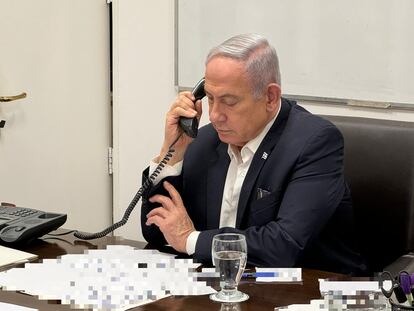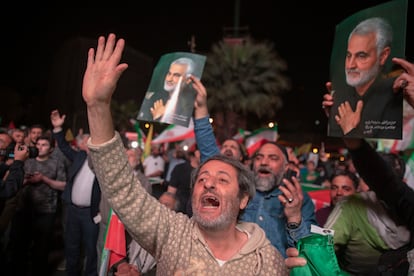Israel says it intercepted with its allies 99% of the more than 300 drones and missiles launched by Iran
The country is reopening its airspace after the unprecedented early morning attack. All eyes are now on Netanyahu’s expected retaliation and the role the United States will play

Israel woke up on Sunday with a sense of euphoria after having intercepted — with the help of the United States, the United Kingdom and neighboring Jordan — 99% of the more than 300 drones and cruise and ballistic missiles launched by Iran on Saturday night, in an unprecedented attack that has plunged the Middle East into uncharted territory.
The attack was the predicted retaliation for Israel’s assassination of seven Iranian military commanders in a bombing of a consular building in Damascus two weeks ago. It marked the first time Iran had attacked Israeli territory after years of covert warfare. Iran’s allies in Lebanon, Yemen and Iraq also launched projectiles, Israel’s Defense Forces (IDF) spokesperson Daniel Hagari said earlier in the day. Israel does not officially consider the conflict over, but it has reopened its airspace — which it closed before midnight — and the fighter-bombers that shot down dozens of missiles outside Israeli territory are returning to base.
The attack came with warning: the drones — with the GPS signal altered to stop them being guided — took hours to arrive. No one died in the attack, although a young girl was seriously wounded, and there was hardly any material damage. Israeli Prime Minister Benjamin Netanyahu praised Israel’s response with a brief message on X: “We intercepted. We blocked. Together we will win.”
Tehran said: “the matter can be deemed concluded” and threatened “considerably more severe” action, should Israel “make another mistake.” All eyes are now on the foreseeable retaliation from Netanyahu, who made it clear that he would target Iran directly if it attacked Israeli territory, and the role of the United States, which has been reluctantly dragged into a conflict it tried to prevent.
Hagari said that no drone penetrated Israeli territory. Only a handful of missiles. The IDF spokesperson insisted that Iran’s retaliation was not measured, because it launched up to 110 ballistic missiles, which he described as a “major escalation” that sought to cause “much more significant” damage than it achieved. At around 02.00 local time, the trails of projectiles were seen in Jerusalem and other parts of the country, anti-aircraft alarms sounded and explosions were heard — the sounds usually made when Israel’s anti-missile shield intercepts missiles.
The attack has served to strengthen relations between U.S. President Joe Biden and Netanyahu, just as their differences over the war in Gaza had become wider and more public. They spoke by phone, and Biden told Netanyahu that Israel — his great ally in the Middle East — “demonstrated a remarkable capacity to defend against and defeat even unprecedented attacks, sending a clear message to its foes that they cannot effectively threaten the security of Israel.” Biden also announced that he would convene the other G-7 leaders “to coordinate a united diplomatic response” to Iran’s attack, which comes amid the biggest crisis the region has seen in half a century: after six months of bloody war in Gaza and increasingly violent skirmishes between Israel and the Lebanese Hezbollah militia, an ally of Tehran.

Israel reopened its airspace on Sunday morning, which it closed before midnight. It also lifted the order for residents to stay close to protected areas in at-risk cities such as Nevatim (which has an air base that was one of the targets), Dimona (which houses the nuclear power plant believed to be developing atomic weaponry) and Eilat, in the southern tip of the country, where thousands of Israelis who have been evacuated from other areas have been sheltering. In recent months, the Houthi rebels had also launched drones from Yemen against this city. Neighboring Jordan, a U.S. ally that has had diplomatic relations with Israel for three decades, intercepted dozens of the drones as they entered its airspace.
The measures that the Israeli army decreed late on Saturday are still in place: the cancellation of educational activities throughout the country and a 1,000-person limit on gatherings in open areas. “In recent years, and especially in recent weeks, Israel has been preparing for a direct attack by Iran. Our defensive systems are deployed; we are ready for any scenario, both defensively and offensively. The State of Israel is strong. The IDF is strong. The public is strong,” said Netanyahu, shortly before the announcement of the drone strike. “We have determined a clear principle: Whoever harms us, we will harm them. We will defend ourselves against any threat and will do so level-headedly and with determination,” he added.
Restrained action
In Iran on Sunday, a working day in the country as in Israel, there is an atmosphere of normality, explains Raffaele Mauriello, a professor at Allameh Tabataba’i University, from Tehran. “Almost all my students have come to class, although some a little later than usual because they have been following the news until the early hours of the morning,” explained the expert on Iran. “The Iranian response has been more or less what everyone expected. And now it remains to be seen what the Israelis will do,” the professor said.
Calls for restraint and Biden’s blunt warning on Friday did not prevent the attack. Saturday began with a measured action by Iran that did not cause injuries or directly attack Israeli territory. Iran’s Revolutionary Guard boarded a ship in the Strait of Hormuz, which is partially owned by an Israeli businessman. This gave Iran two advantages: it showed its ability to inflict economic damage in the Strait of Hormuz — an important sea passageway between Iran, Oman and the United Arab Emirates — and it raised doubts about whether this was just the first step of a larger action, with the ambiguity playing an important role in the psychological warfare that was resolved hours later.
The container ship is owned by a subsidiary of Zodiac Maritime, a leading international shipping company. The company is partially owned by Eyal Ofer, an Israeli businessman whose ships have been attacked in the past. Iranian forces rappelled down from a helicopter and took the vessel back to their country, the state-run Irna news agency announced. Zodiac Maritime said that ship belonged to one of its subsidiaries, Gortal Shipping Incas, which had it “long-term leased” to Mediterranean Shipping Company, the world’s largest container shipping line. Seventeen of the crew members are Indian, according to India’s authorities.

It was, however, a very weak blow compared to Israel’s provocative attack, which targeted high military commanders in a consular building in another country. Following the assassination, Tehran made it clear that it did not want an open war, but neither did it want to let Israel’s attack go completely unpunished, as this would make the country look weak. Its decision to launch an unprecedented direct attack on Israel is set to have both unpredictable and predictable consequences. Israel is expected to retaliate with a forceful attack on Iranian territory.
Israel, in fact, has until now mainly managed its confrontation with Tehran through assassinations of nuclear scientists, cyberattacks and bombings against Iranian forces or its allies in other countries, such as Syria or Lebanon. Iran also used to shy away from direct conflict, acting instead via its allies, such as Hezbollah in Lebanon, other militias in Iraq and Syria, the Houthis in Yemen and to a lesser extent Hamas, the Islamist group that launched the Oct. 7 attack on Israel.
After October 7, the deadliest day in Israel’s 75 years, Israel has signalled that it wants to transform what it calls the “security equation” in the Middle East. It was stepping up attacks against Hezbollah, pushing the conflict to an all-out war, when it bombed Damascus two weeks ago, a move that ostensibly raised the risk of conflict. After Saturday’s attack from Iran, the question is whether Israel will be satisfied that it has “restored its deterrence capability” and how it might want to change the “security equation” in the Middle East.
Sign up for our weekly newsletter to get more English-language news coverage from EL PAÍS USA Edition
Tu suscripción se está usando en otro dispositivo
¿Quieres añadir otro usuario a tu suscripción?
Si continúas leyendo en este dispositivo, no se podrá leer en el otro.
FlechaTu suscripción se está usando en otro dispositivo y solo puedes acceder a EL PAÍS desde un dispositivo a la vez.
Si quieres compartir tu cuenta, cambia tu suscripción a la modalidad Premium, así podrás añadir otro usuario. Cada uno accederá con su propia cuenta de email, lo que os permitirá personalizar vuestra experiencia en EL PAÍS.
¿Tienes una suscripción de empresa? Accede aquí para contratar más cuentas.
En el caso de no saber quién está usando tu cuenta, te recomendamos cambiar tu contraseña aquí.
Si decides continuar compartiendo tu cuenta, este mensaje se mostrará en tu dispositivo y en el de la otra persona que está usando tu cuenta de forma indefinida, afectando a tu experiencia de lectura. Puedes consultar aquí los términos y condiciones de la suscripción digital.









































